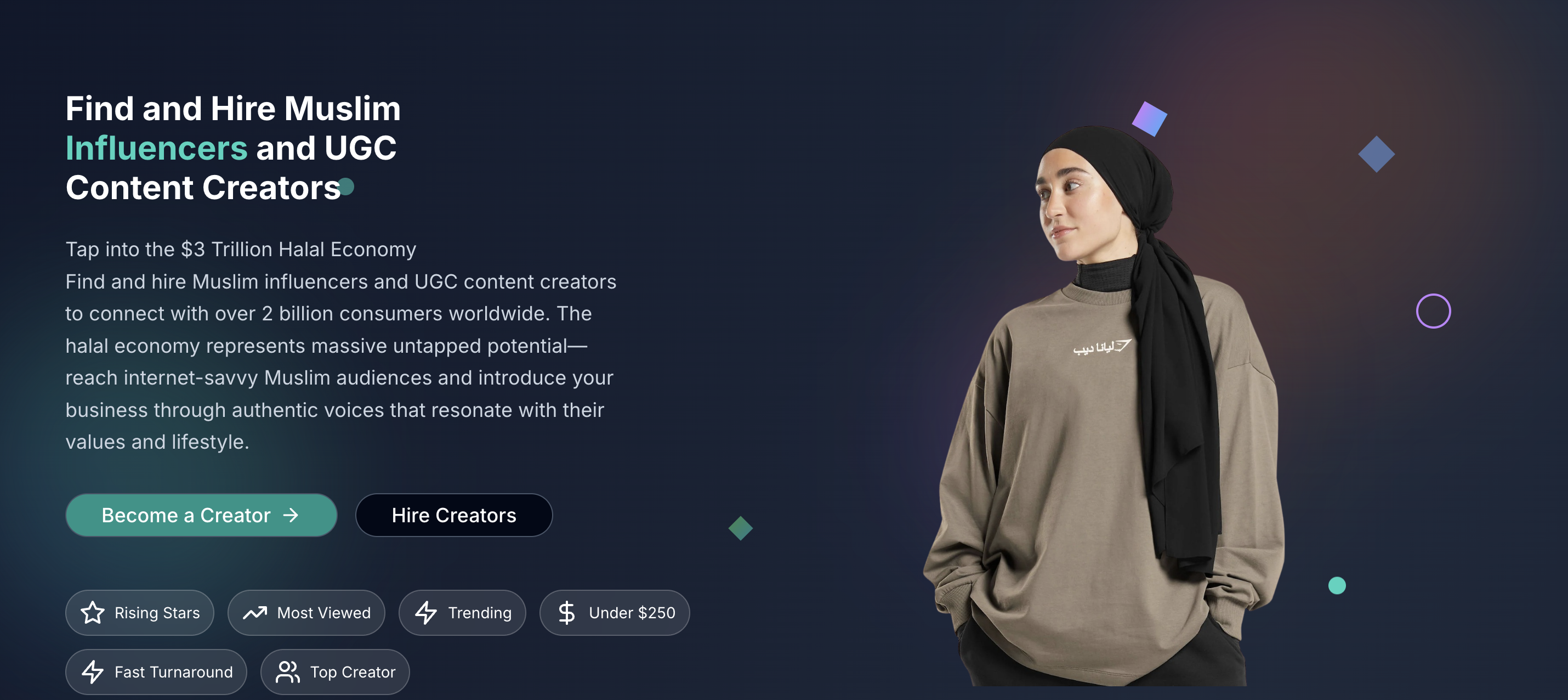Introduction
The digital marketing landscape has evolved, and with it, the demand for diverse, authentic voices has skyrocketed. Among these, Muslim influencers and UGC (User-Generated Content) creators have carved out a powerful niche. They’re bridging the gap between faith, culture, and commerce—helping brands reach audiences in meaningful, value-driven ways.

Understanding the Muslim Audience
The global Muslim population exceeds 1.9 billion—nearly one-fourth of the world’s people. This audience isn’t just massive; it’s also young, connected, and brand-conscious. Muslims worldwide are increasingly using social media to express identity, values, and creativity.
But here’s the catch—authenticity is everything. Muslim consumers can quickly detect whether a brand genuinely respects their values or is merely exploiting faith-based marketing.
Why Brands Should Collaborate with Muslim Influencers
Working with Muslim influencers isn’t about ticking a diversity box—it’s about connecting with a vibrant, loyal, and engaged community.
Representation and Inclusivity
Representation matters. Collaborating with Muslim influencers ensures diverse voices are seen and heard, promoting social inclusion.
Trust and Credibility
Muslim influencers have a strong bond with their audience. Their followers trust their recommendations because they resonate on cultural and ethical levels.
The Power of Halal Branding
The halal economy is booming—from food and cosmetics to fashion and travel. Brands that align with halal values instantly gain credibility among Muslim audiences.
Types of Muslim Influencers
Lifestyle and Fashion Influencers
Modest fashion influencers like Dina Tokio and Habiba Da Silva are redefining style standards for Muslim women.
Halal Food and Travel Creators
From halal restaurant guides to travel bloggers uncovering Muslim-friendly destinations, these creators inspire adventure without compromise.
Faith-Based Educators
Islamic educators use their platforms to share motivation, Quranic lessons, and life advice. Their influence extends far beyond commerce—it builds community.
Tech, Business, and Finance Influencers
Muslim professionals in tech, finance, and entrepreneurship offer valuable insights for brands targeting career-driven audiences.
What Is UGC and Why It Matters
User-Generated Content (UGC) is any brand-related content created by customers or fans rather than the company itself. UGC feels genuine, relatable, and human. It builds community and boosts trust in ways that traditional ads simply can’t.
Muslim UGC Creators – A Hidden Gem
Muslim UGC creators offer something rare: authenticity with cultural integrity. Their content aligns with Islamic values—showcasing products in halal, modest, and ethical ways.
How to Find Muslim Influencers
We at Muslimmarketing.io have launched a new platform called Musliminfluencers.io, using this platform you can hire different Muslim influencers and UGC content creators.
Social Media Hashtags
Try hashtags like #MuslimInfluencer, #HalalLifestyle, or #ModestFashion to find rising talent.
Community Connections
Engaging with Muslim associations, online groups, or local events can uncover authentic voices.
Best Platforms to Discover Muslim Creators
- Instagram: Perfect for lifestyle and fashion influencers.
- TikTok: Great for viral content and storytelling.
- YouTube: Ideal for in-depth reviews and tutorials.
- LinkedIn: Home to Muslim professionals and entrepreneurs.
How to Hire Muslim Influencers
Approach collaboration respectfully and professionally.
Set Clear Goals
Define what success looks like—brand awareness, conversions, or engagement.
Negotiate Transparently
Discuss deliverables, rates, and timelines upfront to ensure clarity and fairness.
Ethical Considerations
Always respect religious guidelines—avoid using sacred symbols or themes in a commercial context. Never tokenize Muslim identity; genuine collaboration builds lasting relationships.
How to Collaborate Effectively
Give creators the freedom to express themselves authentically. Muslim influencers know their audience best—let them guide storytelling in a way that aligns with both brand and faith values.
Example Campaigns That Worked
- Nike’s Pro Hijab Campaign brought inclusivity to sportswear.
- Modanisa’s Ramadan Collaborations celebrated modest fashion with authenticity.
How Much Do Muslim Influencers Charge?
Rates vary widely:
- Micro-influencers (5K–50K followers): $100–$500 per post
- Mid-tier (50K–250K): $500–$2,000
- Macro (250K+): $2,000+ per post
Prices depend on engagement, niche, and exclusivity.
Tools and Platforms to Manage Collaborations
Platforms like Aspire.io, Upfluence, and GRIN simplify communication, contracts, and analytics.
Measuring Success
Track KPIs such as:
- Engagement rate
- Website traffic and conversions
- Brand sentiment and awareness
Future of Muslim Influencer Marketing
The future is bright. Expect to see:
- More halal-friendly brand collaborations
- Muslim creators entering tech, gaming, and finance niches
- Global brands adopting inclusive storytelling
Conclusion
Hiring Muslim influencers and UGC creators isn’t just good marketing—it’s good business. It’s about authenticity, diversity, and connection. By embracing Muslim voices, brands can tap into one of the world’s most dynamic, values-driven audiences while fostering genuine community engagement.

Add a Comment